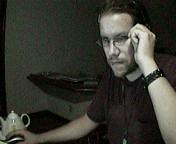The New Commonplace - The SENS Challenge
Some know of the unpleasant anti-Aubrey de Grey articles some time ago published in the MIT Technology Review. For those that don't, Aubrey is a biogerontologist who works in anti-aging research, specifically for halting and reversing age-related decline in adult subjects, currently mice. (see Methuselah Mouse Prize) Two articles were written, one a mildly negative biographical sketch of de Gray and his opinions and goals, the other a much more negative abstract dismissal of de Gray and his goals. Needless to say, his more erudite defenders(including yours truly) wrote the Technology Review and chastised them for poor science, poor journalism, and poor form.
Pontin, the writer of the more negative piece, went to some gerontologists for return ammunition for a further piece, but was shocked to find that no reputable gerontologist would be dragged into the fracas. And so, MIT Technology Review begins their attempt to find some decent arguments, by offering a 20,000 dollar bounty on a 750 word piece explaining why de Grays ideas wouldn't work.
((In capsule form, de Gray proposes seven architectural strategies, which he calls SENS(Strategies for Engineered Negligible Senescence) which will provide it's patients with indefinite, or at least indeterminitely extended natural lifespans. ))
In my view, and de Gray's, this editorial desperation is emblematic of two things. First, the surprising intellectual honesty of mainstream science, unwilling to deride radical ideas, so long as they do not violate known scientific law, and second, the unusual resistance from journalists to admit they are not qualified to judge the scope of scientific progress. To further a nasty analogy I am reminded of a New York Times article which lampooned rocketry pioneer Goddard for stating that rockets would work in a vacuum. ((The author of that piece confused the methods rockets work on(inertial reaction mass) with an aerodynamic interaction(like propellors) and claimed rockets would have nothing to push against)).
Three cheers for Aubrey de Gray for sticking to his guns and being quietly scientifically credible. Having big wild ideas doesn't mean you have to be ridiculed by Established Science, because for the most part, scientists are people too. It's just when you run around saying ridiculous unprovable things that scientists are forced to disagree.
I'm glad this sort of thing is happening. I am a supporter of Aubrey's work, and believe it deserves support. Now back to creating an artificial intelligence.
skip to main |
skip to sidebar

Some musings by your outlawpoet guide, with links, txts, and descriptions
About Me

- outlawpoet
- Justin Corwin is a pragmatic phlegmatic, with odd flashes of engineering insight.
Blog Archive
-
▼
2005
(103)
-
▼
July
(6)
- The New Commonplace - The SENS Challenge Some kno...
- dbacl project homepage A bayesian spam filter is ...
- "I don't think I would like to be chopped up and t...
- I'm outta here. I'll be back online and in touch...
- AdaptiveAI Opportunities Page Since posting the l...
- Jurors Acquit Ex-IRS Agent woah "Silence can be ...
-
▼
July
(6)
"In the mirrors of many judgments my hands are the color of blood. I am a part of the evil that exists in the world and in Shadow. I sometime fancy myself an evil which exists to oppose other evils. I destroy Melkins when I find them, and on that Great Day of which prophets speak but in which they do not truly believe, on that day when the world is completely cleansed of evil, then I, too, will go down into darkness, swallowing curses. Perhaps even sooner than that, I now judge. But whatever... Until that time, I shall not wash my hands nor let them hang useless."
--Corwin "The Guns of Avalon" by Roger Zelazny
No comments:
Post a Comment